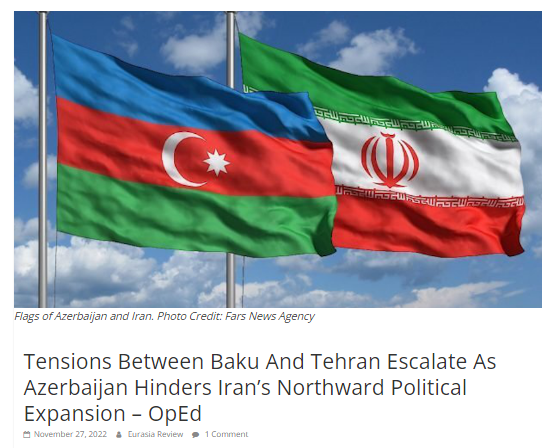The Russia-Ukraine war has overarching implications for all the international relations across the globe but primarily for those in the neighboring regions. One major implication of the war is related with the growing reliance of Russia on Iran for military supplies and the opportunities the latter offers for circumventing Western sanctions. This presents a chance to Tehran to expand its influence northward into the South Caucasus, Central Asia, and even into the Russian regions of the North Caucasus and the Middle Volga. Iran is seemingly rather interested to seize the opportunities created by this opening and establish influence in the northern regions that used to be reluctantly seen in Tehran as Russia’s “sphere of influence”.
The South Caucasus is such a region that Iran has had to recognize as “belonging” to Russia since two centuries in accordance with the Treaty of Turkmenchay (1828). Although Russia remained the major power broker in this area for the significant part of the post-Soviet period, the recent years marked Turkiye, Iran’s regional rival, becoming increasingly more present in different spheres in the region. The Russia-Ukraine war complicated the situation more for Iran as the European Union (EU) and United States have increased their influence in the South Caucasus by boosting their mediating role in the Armenia-Azerbaijan peace process, effectively sidelining Russia therein and deploying a monitoring mission to the Armenia-Azerbaijan border in the aftermath of Prague summit (October 6). Against this background, increasingly closer relations between Israel and Azerbaijan and the emerging possibility of the formation of Israel-Turkiye-Azerbaijan trilateral cooperation platform further enrage the Iranian authorities.
For Iran, the “encroachment” of the external players into the region is inadmissible and therefore Tehran is determined to use military and other instruments to fill in the power vacuum emerges in the region in the wake of Russia’s decline. In this endeavor Iran effectively enjoys the support of Armenia whose leaders try to use the Iranian card against their common enemies of Azerbaijan and Turkiye. The recently growing ties between Armenia and Iran have provided Tehran a useful chance to get into the South Caucasus more assertively and form a de-facto alliance against the two Turkic states. Towards this end, Yerevan and Tehran are clearly building up their cooperation in various spheres, including military and economy. Apart from aiming to boost bilateral trade turnover from $700 million to $3 billion, Iran is also discussing supplying combat drones to Armenia.
In parallel, Iran is pressuring Azerbaijan militarily and forces it to consider Iran’s regional interests and concerns. The large-scale military exercises launched by Iran’s Islamic Revolution Guards Corps (IRGC) on October 17 along the country’s border with Azerbaijan have so far been the loudest manifestation of Iran’s pressure. The exercises deployed pontoon temporary bridges to train forces and military vehicles to navigate through water obstacles which sent distressing signals to Baku as the natural border between Iran and Azerbaijan is the Aras River in many sections.
Iranian officials signaled that the military exercises meant to warn against the Zangazur corridor project which is promoted by Azerbaijan to connect with its Nakhchivan exclave via the southern Armenian territories. For Iran, this corridor is designed to cut off Iran from Armenia and establish a “geopolitical corridor” of the Turkic world by connecting Turkiye directly to Azerbaijan and Central Asia. However, considering that the Zangazur corridor is planned to be under the control of the Border Guard Service of the Federal Security Service (FSB) of Russia and Moscow has singled out any extraterritoriality along this corridor, Iran’s statements linking its military pressure with the Zangazur corridor do not sound convincing.
Iran is most concerned by Azerbaijan’s policies to deepen military and economic ties with Turkiye and Israel and as such forming a stumbling block to the expansion of Iranian influence inward the South Caucasus. The potential effect of these developments to the ethnic Azerbaijanis in Iran whose number is variously estimated to be between 20 and 30 million is another frightening source of concern for Iranian political and security elites. Iran has long made various initiatives to garner public support in Azerbaijan against the Azerbaijani government and push for an Islamic revolution. The most recent such a move was neutralized by Azerbaijan in early November when the state security agency DTX arrested 19 citizens that it accused of being trained and funded by Iran in order to spy for its intelligence services. The group was sent by Iran to Syria for training and had plans to act against Azerbaijan’s national interests, the agency said in a statement.
Thus, Iran’s attempts to take the advantage of the decline of Russian influence in the South Caucasus and dominate the regional politics is countered by Azerbaijan. However, the power asymmetry between the two sides makes the support of Azerbaijan’s allies extremely important for Baku to resist against this pressure. While Azerbaijan can rely on the backing of Turkiye and Israel, but more assertive support by the EU and United States is critical.








